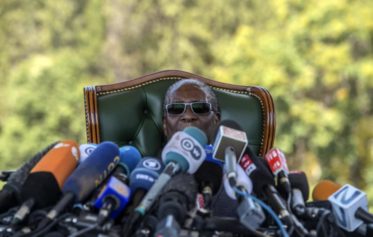In a case that highlights the hypocrisy of American foreign policy, a man in Chicago was sentenced to 15 months in prison because he was paid to lobby American officials on behalf of Zimbabwe President Robert Mugabe in an effort to get the sanctions against Zimbabwe lifted.
President George W. Bush first imposed sanctions against Mugabe and other senior government officials in Zimbabwe in 2003 for what the administration called human rights abuses and corruption. They have been continued under President Obama. As part of the sanctions, individuals are prohibited from providing services on behalf of or for the benefit of Mugabe and others.
C. Gregory Turner, 72, was found guilty by a federal jury last October of violating the International Emergency Economic Powers Act. In addition his co-defendant, Prince Asiel Ben Israel, 73, also of Chicago, was sentenced last August to seven months in prison after pleading guilty to violating the Foreign Agents Registration Act.
They were accused of meeting many times in Africa with Zimbabwean government officials, including Mugabe and Gideon Gono, governor of the Reserve Bank of Zimbabwe, who were both subject to U.S. sanctions. Turner and Ben Israel were reportedly paid a fee of $3.4 million in a November 2008 consulting agreement to engage in consulting and lobbying efforts with government officials, including Illinois members of Congress, to try to have sanctions lifted, according to prosecutors.
While Turner claimed he was acting out of humanitarianism, prosecutors said he was really in it for the money.
“He sought to parlay his close relationships with well-connected government officials to score a big payday,” prosecutors argued in court documents.
But in a country where there are lobbyists for every morally bankrupt activity imaginable—there are lobbyists paid exorbitant sums to convince public officials to let the banks rip off consumers as much as possible—it feels unseemly to send a man to jail for asking some public officials to consider lifting sanctions.
After all, in a public memo written by the U.S. State Department itself, the department claims that the sanctions against Mugabe and company are in no way intended to halt individuals from doing business with the country.
“Unless a transaction involves a blocked individual or entity, U.S. persons may, and are encouraged to, conduct business in, and trade with, Zimbabwe and its people,” said the memo written by an employee at the embassy in Harare, Zimbabwe’s capital city.
China has a long history of human rights abuses and government repression of the populace, but China is the largest foreign holder of U.S. debt, which means it is propping up the U.S. economy. There is no chance of any sanctions against China—just another example of how money and special interests rule American foreign policy.
After all, it was Mugabe who helped win freedom in 1979 for his people from a brutally repressive white-controlled regime in what was then called Rhodesia—a nation actually named after Cecil Rhodes, the man whose legacy is celebrated every year with the awarding of the prestigious Rhodes scholarship. But Rhodes, in forming the African nation of Rhodesia, both physically and systemically slaughtered Blacks as a part of his mission to obtain more land for the Anglo-Saxon race. He enslaved the Africans native to the land and brought in whites from Europe in the late 1800s to confiscate gold and diamonds. That is the white legacy in Zimbabwe.


